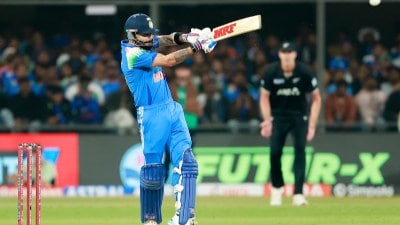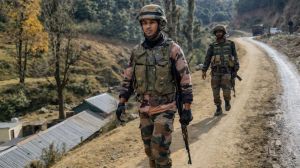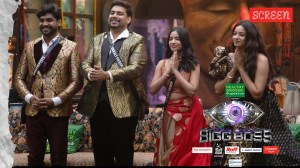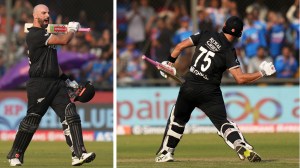The history sheet
nbsp; 8220;The 600 years between Harsha and the Sultanate are virtually ignored by the left. Tribal groups formed kingdoms in this per...

| nbsp; | 
8220;The 600 years between Harsha and the Sultanate are virtually ignored by the left. Tribal groups formed kingdoms in this period, but it doesn8217;t fit the stereotypes of caste stratification.8221; Meenakshi Jain Medieval India phased out |
THIS week India returned to the Great History Textbook Debate. The National Council for Educational Research and Training NCERT has introduced new textbooks 8212; actually, reintroduced old textbooks 8212; that have been accused of a 8216;8216;leftist bias8217;8217;, of factual inaccuracies and of being 8216;8216;insensitive8217;8217; to Indian tradition.
The sense of deja vu is inescapable. Four years ago, at the height of NDA rule, an NCERT director introduced history books that were accused of a 8216;8216;rightist bias8217;8217;, factual inaccuracies and being 8216;8216;unscientific8217;8217;. The books the BJP-led government replaced have now been reintroduced.
If the plethora of history textbooks is confusing, consider what it must do to the hapless schoolchild!
It all began 8212; as even a contest of contested histories must begin 8212; one evening in 1999 when J.S. Rajput, a physicist by training who had been appointed NCERT director by the BJP government, was handed a file to sign.
8216;8216;It was approval to fight a case in the Punjab and Haryana High Court,8217;8217; recalls Rajput, 8216;8216;against Sikh groups that had filed a petition against a textbook. It said 8216;the Mughal administration ordered the execution of Guru Tegh Bahadur8217; 8230; As if he were a criminal.8217;8217; It also speculated 8216;8216;family intrigue8217;8217; was the cause of his death.
8216;8216;I called for the book,8217;8217; says Rajput, 8216;8216;and consulted Khushwant Singh. He told me the author had quoted only some of the contemporary sources.8217;8217;
Subsequently, Rajput8217;s NCERT framed a new curriculum, on the basis of which new syllabi were devised and new books commissioned. The old history textbooks were junked. Some of them had been around for three decades, having been written by the people like Bipan Chandra, Romila Thapar, Satish Chandra, eminent 8220;progressive8221; historians.
THE new curriculum was taken to court. In September 2002, the Supreme Court upheld it and the new textbooks, written by BJP-friendly historians, were introduced. To quote Satish Chandra 8212; his Medieval india was replaced but is now back 8212; 8216;8216;The history books that were being taught till recently were infused with a political party8217;s own agenda. School textbooks should never be based on legends and myths.8217;8217;
The books introduced in 2002 were of uneven character. 8216;8216;There were honourable exceptions such as Meenakshi Jain,8217;8217; says a former HRD Ministry official, 8216;8216;but some read badly.8217;8217; Devendra Swarup, doyen of 8216;8216;right8217;8217; history says, 8216;8216;Yes, improvements could have been made. But at that point it was important to remove books with a leftist prejudice. And please consider some of the left authors of those books are not great scholars. One of them is an MA third class, known only as a textbook writer.8217;8217;
THE battle is getting complicated. Within the 8216;8216;secular8217;8217; historian camp there are divisions between those who have a stake in the textbook market and those who don8217;t.
Authors like Satish Chandra, Bipin Chandra and R.S. Sharma are octogenarians. Says a 8216;8216;liberal8217;8217; historian, 8216;8216;They have to give way to younger historians, from their side.8217;8217; Some historians have advocated doing away with the chronological approach altogether and focusing on themes 8212; gender, caste.
The divisions are apparent. Two years ago, Delhi8217;s Congress government asked its state body to write history textbooks, rejecting the 8216;8216;communal8217;8217; NCERT ones. The project was overseen by educationist Krishna Kumar.
Recently, the Delhi government8217;s textbooks were torn apart by a leftist historian. Among other things, he objected to baby Pervez Musharraf8217;s migration to Pakistan being listed as a noteworthy event in Delhi, 1947-48.
Kumar is now the UPA-appointed NCERT director. His job is to frame a new curriculum, devise new syllabi and commission new textbooks.
So by 2006-07 expect new textbooks, albeit a case of New Left replacing Old Left.
Says Bipan Chndra, 8216;8216;I am in favour of new textbooks provided they are of historical insight and integrity and not based on myth 8230; I am in favour of the syllabus being reviewed very frequently and the books accordingly updated.8217;8217;
Interestingly, Bipan Chandra8217;s Modern India was first written in 1990. Fifteen years on, the newest reprint will be taught to class XII pupils. As in 1990, 8216;Modern India8217; still ends in 1947.
and
- 01
- 02
- 03
- 04
- 05






























